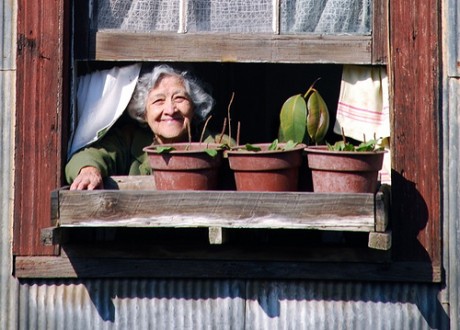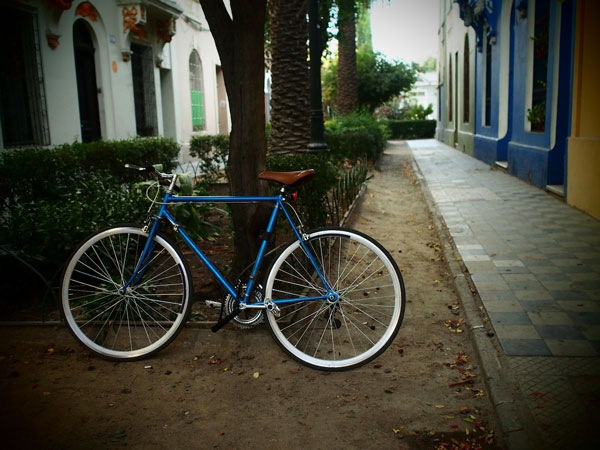One of the things you can imagine about living on an island, or in a small community, is that you’d better watch what you say and do, because if you don’t, someone’s going to tell your momma. Or if not tell your momma, they’ll gossip about it themselves, and peer at you strangely when you go by. It might be that lady up there, looking out her window, or it might be someone else. But somehow, people will find out. And when they do, it won’t be pretty.
For years, I have heard people talk about how Chile is an island. Ecologically, it’s true, as it turns out pretty much no plant or animal gets in unless we bring it in, because we’re bordered by ocean on two sides, the driest desert in the world on one, and the Andes on the other.
Chileans often use the island analogy to talk about how isolating it is to be here, when they know that great ideas are happening elsewhere. A photographer I know is convinced his career will take off and creativity will skyrocket if he could go would and study somewhere else (and he may be right). A guy I met the other night who does interactive art has to go study somewhere else, because “acá no hay” (lit: here there isn’t any of that). Chile is just now starting to host important conferences, Global Voices was here a few years ago, and TEDtalks is coming on Saturday (and no, I wasn’t able to score a ticket), and Common Pitch, which I’ll be honest, I’m not really even sure what it is, is also coming this weekend.
But despite that, the “somos una isla” (we’re an island) prevails and prevails. For me (and I actually did grow up on an island, but not that kind of island, Brooklyn hardly seems like a small town, nor does Long Island, where it is located), I have had a hard time understanding how, exactly, this affects people, and why they say it all the time, because well, I didn’t grow up here.
The Expression
Alot of words and expressions get whirled around me, and I guess I listen pretty carefully and I love language, and expressions, and last night someone asked me (first time I’ve heard it phrased like this), “¿Si eres gringa, porqué hablas como latino?” (If you’re a gringa, why do you talk like a latino?). But despite how I talk, I’m not from here, or Latin America at all. And there are some expressions I’ll never get behind. And one of those expressions is “el que dirán.”
Language check. Just so we know what we’re dealing with here, here’s a mini Spanish lesson.
Qué (with an accent mark) is what, where what is asking a question.
Que (without an accent mark) is the what of relative clauses, or where what that does not ask a question (I don’t care what you say, that que/what does not get an accent mark) There’s some question as to which que goes here, but we’ve settled (with the help of a commenter) on the one with the accent mark, details below.
Decir is to say
Dir– is the root of decir
–án is the simple future ending for the third person plural (ellos, ellas, Ustedes)
and in buen chileno (good Chilean Spanish), like in good Brooklynese, there is a powerful and invisible “they.” No one knows who “they” are, but “they” smashed up your car or “they” are building a new superhighway through your garden. In Spanish this invisible “they” shows up in the verb ending for ellos (they/them).
¿Qué dirán? asks the simple question “what will they say?” It differs from “¿Que van a decir?” (also what will they say, but with a different verb tense). ¿Qué dirán? gives you a sense of urgency and irrevocability and importance. Or at least it does for me (native speakers, feel free to disagree). In addition, in the sentence “¿Qué van a decir?,” there’s this sense that the object is missing. Let’s fix that. “¿Qué te van a decir?” What are they going to say to you, or what are they going to tell you.
But there’s no “te” in my “Qué dirán?” That’s because this invisible “they” is not going to say anything to you, they’re going to say it about you.
But this isn’t really about what people will or won’t say about you, which would be about ¿qué dirán?
This is about El qué dirán, which turns the question into a noun.
Urban Dictionary defines it thusly:
El Qué Dirán
The unspoken belief in latin-american culture that every person’s actions in society are subject to the scrutiny and criticism of every person they know. El Qué Dirán is a way to regulate the behaviors of the fringes of Latin America, by concentrating the disapproval of their parents and friends through gossip…
It is no longer a question, but rather an invisible societal force that prevents you from acting in a way unbefitting to your friends, family, church, state, sopaipilla vendor, etc, so that no one will talk trash about you behind your back. It is a way of ensuring conformity, and also, ironically, of making fun of people who are conformists. You can say that someone is “super preocupado con el qué dirán” (very worried about the “what people will say.”)
Gossip is such a strong part of the culture here, we even have three words for it, chisme (Spanish proper), and cahuín, the second of which can also be used to describe an event at which you pelar (make fun of, literally “to peel” people). Copuchar is another good one, with a gossipy person being a copuchenta. All three are usually considered to be the domain of women. Ahem.
I had never really bought Chileans insistance that this is an island culture (and holy big island, with 4000 km of coastline, and 17 million inhabitants). But when I hear people talking about el qué dirán, I think one of two things. Either we’re living on an island, or in a time warp.
When was the last time you asked yourself “but what will people think?” or “what will people say?” Or at least asked it out loud? Or tried to control other people’s actions on the basis of public disapproval? To me it seems like something June Cleaver would say to Wally to keep him in line.
The Cost
I think it’s a terrible drain on the national self-esteem levels, and on creativity, and innovation, and free-thinking, and a bevy of other things I was brought up (in the United States) to value. Though on the other hand, no one is ever going to talk about Chileans as a culture of know-it-alls or self-aggrandizers (which would likely pain them). Not so, United States. On the other, other hand, who gives a rat’s poto what people say? It’s a bit of a cycle.
I really wish in Chile, we could get a little less of “what will people say,” to say nothing of “el chaqueteo” (pulling people down (by their jackets), to make sure that if not everyone has success, then no one does.), and just see what bubbles up to the top. Maybe what they’d say is “man, what a genius, I wish I’d thought of that.” A little orgullo ajeno, if you will (being proud for other people, and I’m pretty sure I invented this term).
–Commenter Nat says it should be el qué dirán, not el que dirán, according to the RAE. I’m not sure I agree, but they’re the RAE, so I made the change.











Language is the way a culture regulates and separates itself from other cultures, so this one is a case of have-cake-eat, Eileen. You can’t have the Chilean way of life that you enjoy so much without the social controls that the language imposes on its people that apparently annoy you. It’s a holistic package.
It’s a point of friction, not an annoyance per se. There are things I love about being here, and elements of the lack of insane drive at the cost of all others that I appreciate. There is more “solidarity” as they say. I will always be a fish out of water here. Thanks for commenting, food for thought!
Why don’t you take your social regulations and well, allow me to wear a slightly more lavender shade of blue shirt with white collar with my red tie and dark suit? Or rather…why don’t you take your social regulations, shove em up your http://www.youtube.com/watch?v=kiySknl9zs0
link rain! and a song. and conformity. Yay.
You should also mention the “Vergüenza ajena” issue, e.g. “cuando tu amigo contó la historia, me dió vergüenza ajena,” which could be translated as “I was ashamed on behalf of your friend” and the well-known phrases: “a mi me daría vergüenza” or “no te da vergüenza”
you didn’t click on the “orgullo ajeno” link. It’s all about that. And it makes my stomach turn every time. Thanks for dropping in, and sharing on FB!
my bad! 🙁 ahora debes sentir vergüenza ajena! jajajaa
I think you’re bang-on, Eileen. There is social pressure here to conform, no reward for being independent or individualistic. I’ve often said that Chile reminds me of growing up in Texas way back when (exact decade undisclosed). We toed the line because “what would the neighbors think.” Losing your good reputation was a bit like losing your virginity. Once it’s gone, you’re never getting it back.
Really? you mean… The good thing is that Chileans already kind of think we’re (foreigners are) a bit loopy.
Hi,
Although grammatically it is correct to translate “el qué dirán” to “what will people say” I think the right translation is “what would people say”. It is one of those oddities that you find in Chile and in South América. You are not worried about what people _WILL_ say but about the possibility that they might say something. In other words: is not that they say something, it is that they might say something.
Fortunately that feeling is starting to disappear, at least to my “almost” tourist feeling. People are less scared of doing stuff, whatever it is and are taking more risks. You can see that in the entrepeneurship environment, there is more people starting business on their own than never before. You can also see people not being afraid of failing in what they do. I agree, it is not everybody but it is slowly changing.
Finally I leave you with a very funny video by Ricardo Arjona. It is pretty old but it reflects the “qué dirán” cultura pretty well.
Hey Carlos! Where’s my video?
Also, I would argue that it is an idiosyncrasy of American English, or at least my dialect, that we say “What will the neighbors say” or “what will people say” as a way to get someone not to do something, not what would they say if you did something. I wouldn’t say, “what would they say.” It sounds grammatically incorrect, but if I were having a conversation, I’d say, “he won’t paint his house magenta because what will the neighbors say.” Well, now that I think about it, they might be interchangeable. But in this expression “what will people think,” it’s definitely “will” not “would” for how I mean it. So I’m sticking to my guns. Now where’s my video?!
Typical, same as with emails… I forgot the attachment 🙂 http://www.youtube.com/watch?v=JVgcToMKTGc
Another one that might be related http://www.youtube.com/watch?v=l3z0__yILi0
Well, you are the native speaker so I’ll trust your judgment. However, the expression does not refer to the “content” of what people might say, but to the fact that they might talk about you. Specially older generations were very afraid of being mentioned in conversations.
And in fact if you go to the country side, you will still hear people describe people as “good” if there were no stories about them, regardless if they were good or bad stories.
En realidad es *bien* feo que tengamos una expresión de uso popular para la vergüenza ajena y no para el orgullo. Pero, como buena chilena que jamás ha pensado en estos asuntos, me siento obligada a comentar algo sobre la vergüenza ajena. Para mí (y mi grupo de amigos también lo vive de la misma forma, me atrevería a asegurar) la vergüenza ajena no es schaudenfraude. Es casi un dolor físico de querer y no poder ir a decirle a alguien que está haciendo el ridículo.
(y si lo pienso detenidamente, ¿si a la otra persona no le importa lo que estén diciendo de ella, pa’ qué miéchica sufro yo?)
Bueno es schaudenfraude tal vez lo puedo perdonar, pero la manera de que yo lo he escuchado es como si la persona que profesa su “vergüenza ajena” quiere simpatia por mi parte, por que sufre. Y buen punto lo de al final! El importarse o no lo que dicen de uno es algo que tenemos que desaprender digo yo. Igual caigo, pero cada día menos. Gracias por comentar, Nat!
Para mí la vergúenza ajena siempre ha sido esa expresión de molestia en la cara de alguien por verse obligado a presenciar algo que le enseñaron que no es apropiado.
¿Será una forma de auto-regulación social? O sea, si alguien es incapaz de demostrar temor al qué dirán, los demás aplicamos con fuerza la vergúenza ajena (o directamente el pelambre… aunque el pelambre es todo menos directo, já!) para demostrarle a esa persona que está actuando fuera de nuestras normas sociales?
A todo esto, la RAE dice que el qué en el qué dirán sí lleva tilde. También lo define como:
Pero la RAE pretende convencernos de utilizar sólo con o sin tilde, así que está muerta para mí.
El que dirán es un fantasma de la dictadura, en la que uno debía cuidar sus pasos por miedo a ser descubierto en algo que podía o no ser ilícito y ser reportado.
En mi familia el que dirán, desde pequeño, no se le dio importancia y mi mamá es una experta generadora de verguenza ajena en los vecinos que a mi especialmente me da mucho orgullo ajeno.
A demás creo que deberías afinar el ojo un poco, el que dirán y muchas otros conceptos del Chile pacato, para las nuevas generaciones no existen.
El que o qué dirán sigue en pie, a pesar de que va disminuyendo a través del tiempo. En cuanto a refinar el ojo, siempre asumo que tengo la placa madre hecho en EEUU y veo todo lo que veo a través de ese prisma. Hay muchos Chiles, muchos Santiagos y mucha gente que los ve de forma distinta. Mi visión es una sola, y no dudo que hayan muchas más. Me encantaría leer tu visión Andrés, tienes algún blog donde puedo leer la tuya?
Y si la dictadura tiene que ver con el que dirán, eso explicaría las contadas veces que le he escuchado a gente diciendo “cuidado que hay ropa tendida.” Acaso eso tampoco existe hoy en día?
Although I agree in some way with Andres, the expression “el qué dirán” comes from way before the dictatorship times. Even literature from the beginning of the 20th century refers to this, not to mention literature from the 19th century which is full of it. It can also be found in authors outside Chile, such as García Marquez (100 years of solitude is full of it).
Como te habrás dado cuenta, “el qué dirán” forma parte de un complejo e integrado sistema social; es un método de control interno (actúa sobre la persona que se preocupa por sus propias acciones, no necesariamente por que haya literalmente algún tipo de respuesta asociada a la acción bajo cuestionamiento, por parte de la comunidad), y como método de control, no funciona si no está dentro de un contexto.
Ese contexto, llamémosle para fines experimentales “chilenidad”, incluye la cultura del pituto, de preocuparse por lo que le pasa en el ámbito privado a cualquier amigo, conocido o compañero de actividad, y las redes de contactos que generalmente duran para toda la vida.
Al cometer alguna acción, omisión o decir algo que pueda escapar de lo (supuestamente) esperado por la “chilenidad”, se corre el riesgo de contaminar toda la serie de redes integradas que tiene información relevante para nuestro entorno social.
Así, si por ejemplo, eres infiel despreocupadamente a tu pareja sentimental y no consideras “el qué dirán”, ese hecho tal vez nunca te sea comentado directamente por nadie (es decir, muy probablemente nunca escucharás con tus propios oídos lo que dijeron), pero te puede reaparecer como una especie de “dato biográfico” a la hora de que alguien te recomiende para un trabajo, por ejemplo.
Puede que parezca no tener sentido alguno, y probablemente así es, pero más de alguno dirá “Estoy indeciso de recomendar a la Juanita para ese trabajo, es que ella es muy “carepalo”, cuando estaba con Pedro le puso el gorro sin arrugarse, a lo mejor no es tan confiable, si le fue infiel hasta a su pareja”.
Esta red invisible, de la que forma parte el “Qué dirán” y que tiene muchos años más de antigüedad que Facebook o Linkedin, es la que nos amenaza a todos, cual espada de Damocles, pues generalmente va acompañada de la expresión amedrentante “todo se sabe en esta vida”…
El miedo al ridículo, a ser diferente, a no encajar con lo esperado (o mostrar egoísmo al afectar a alguien de forma negativa con nuestras acciones), es un componente clave en nuestra sociedad, posiblemente potenciado durante la Dictadura militar, pero presente desde hace mucho; vale la pena recordar que el de Pinochet no ha sido el primer gobierno militar y represivo que Chile ha tenido.
Perdona, me extendí demasiado, xd
Para nada, Marmo.
A todos les agradezco un montón. Encuentro una maravilla que podemos encontrar un espacio para hablar de que si existe o no existe el qué (gracias Andrea) dirán.
Agradezco en especial dentro de Uds. los chilenos que se tomaron el tiempo de compartir sus opiniones, visiones y experiencias, y por darse la lata de opinar en un blog de extranjera, y leer mis a veces enredadas frases en inglés. No es menor. Pues Andrés, Marmo, Carlos, José, y Nat, muchas gracias!
Ahora, cuéntame, hay algún blog en particular (ojalá de chilen@) que me ayudara a: o ver otra vision o entender mejor la cultura como Uds. la ven? Por favor nada de televisión, me carga. Las películas también valen.
Sigo aprendiendo, y en todo caso, todos mis comentarios hacía y sobre la cultura chilena vienen del corazón, de querer entender porqué algunas personas se comportan tal como se comportan. También reconozco que la cultura de la cual vengo, tampoco es perfecta (lejos de!). Diría que en este caso, lo de el qué dirán, en EEUU a veces la gente se excede, y no le importa pisar los demás para llegar a la cumbre. A eso me refería con el texto de superar a todo costo arriba. Eso no se ve tanto en Chile, y es un alivio.
Bueno, les dejo para que sigan viviendo sus correspondientes vidas, haciendo lo que quieran sin temor ne recriminaciones.
Saludos!
Quizás una película chilena que muestre la cultura sin caer en exageraciones es “Se Arrienda” de Alberto Fuguet. Se puede ver online en http://www.cinepata.com/peliculas/se-arrienda/. Dato freak acerca de la película, el actor principal es actualmente nuestro ministro de cultura.
Otra muy buena pelicula es “Play”, aunque esa pelicula es difícil de encontrar. La película se trata más acerca de la cultura santiaguina y no retrata para nada la cultura de regiones, al menos no como parte principal.
Por último te recomiendo leer algunos libros de Pablo Huneus. Él retrata muy bien algunos aspectos de la vida chilena. El es un sociólogo y analiza muy bien diversos aspectos de la cultura chilena. Dos clásicos de Pablo Huneus: “La peineta amarilla” (título completo: “Por qué te llevaste mi peineta amarilla y me dejaste sólo en París?”) y “En aquel tiempo”.
Mil gracias, Carlos. Anotados! Pero quiero aclarar, que lo que estoy hablando es una visión de Chile desde afuera, es todo mi punto de vista. No pretendo hablar por la gente chilena, ni la gente estadounidense. Hablo por mi misma.